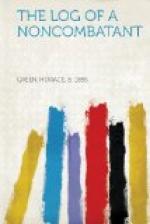I had fifteen minutes to cover the distance.
I ran. The shells, at that time, were falling at a rate, I should judge, of five a minute. Opposite the Castle Steen I had a narrow escape—just concussion, I suppose. Directly above me came a crash of thunder. A few moments later I found myself lying in the street, head pointing north—dazed. A bomb crashed through the eaves and tore a hole as big as a small cellar in the street directly before the old castle, bursting with the concussion of a tornado. For a few moments I sat on the street feeling weak in the legs and unable to move.
Again I started back to the Queen’s. Two hundred yards east of the bridge some soldiers held me up.
“Get back!” they shouted, believing that I was making for the pontoon. They turned me back, and I hesitated a moment. A terrible explosion, louder than anything I had yet heard, rocked the city to its foundations. For a moment the walls of the houses trembled and every window on the waterfront was broken. The retreating Belgian army had blown up that pontoon bridge and with it what then seemed the last hope of escape for the few remaining survivors. For a few moments wreckage writhed in midstream like a great sea creature in agony of death.
Past me rushed groups of Belgian soldiers, the remainder of a few hundred who had been left to cover the British and Belgian retreat, fire the last shots from the forts, and spike the guns as the Germans approached. Pitiable was the terror of these fellows when they saw the bridge gone. Many of them were out of their heads through exposure and exhaustion; not a few of them wept. One sergeant tore off his uniform and fatigue cap and tried to exchange them for my citizen’s clothes.
The worst fire of the entire bombardment was concentrated during these moments; the racket was stupendous. Because gunboats, barges, lighters, tenders, rowboats, were commandeered by the military authorities to ferry across soldiers and wounded there was slim chance for noncombatants. Above the noise of bomb and shrapnel Belgian gunboats added to the confusion by cannonading big boats along the quay. This was done in order that the Germans might not make use of them for the pursuit. It speaks volumes for my military knowledge that for a brief moment I imagined the Germans had embarked upstream and were going to make a river battle of it.
By this time the American correspondents had left the Queen’s, going in different directions for different purposes. Hunt and Thompson, I later learned, went to the American Consulate, where they stayed during the German entry.
For a moment I see-sawed up and down the river bank, remembering I had left my handbag at the Queen’s, but, infinitely more important, that my knapsack with money belt and diary were in the keeping of a peripatetic acquaintance somewhere along the crowded piers downstream. Without that gold, the thousands of miles to New York seemed doubly long. When I at last got back to the barge office a dock-hand pointed to a bench in the corner; there to my intense relief lay the knapsack, where my kind English intelligence officer had left it.




